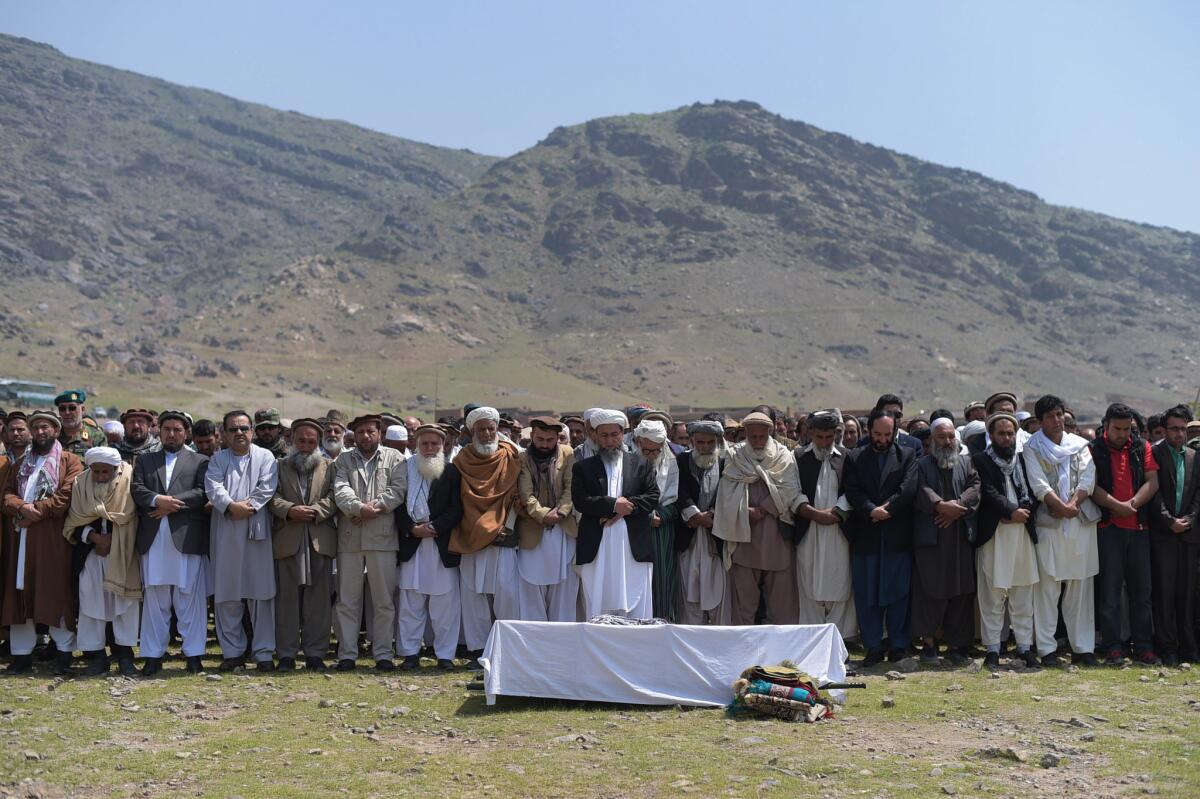Death toll in Taliban bombing and gunfight rises to 64; Afghan president calls the attack ‘inhuman’

Afghan mourners offer funeral prayers for one of the dozens killed in a Kabul bombing claimed by the Taliban and a subsequent gunfight.
- Share via
Reporting from Kabul, Afghanistan — The death toll in Afghanistan from a massive car bombing and gun attack claimed by the Taliban has more than doubled to 64, the Interior Ministry said Wednesday.
Tuesday’s attack in the capital, Kabul, which targeted a directorate responsible for the security of high-level officials and dignitaries, also injured 347 people, including women and children, said Sediq Sediqqi, a ministry spokesman.
The revised toll makes it the deadliest bombing in Kabul since 2011, when an attack on a religious procession resulted in 70 deaths and at least 160 injuries.
The majority of Tuesday’s casualties were civilians, Sediqqi told reporters at a news conference.
The attack reportedly killed dozens of people in the directorate. The initial blast killed 22 people, including 15 cadets and two guards, and a subsequent gun battle involving several assailants left many more dead, according to news reports.
Afghan President Ashraf Ghani lashed out at the Taliban while visiting the injured at a Kabul hospital Tuesday evening, calling the attack “inhuman” and “un-Islamic.”
He went on to accuse the Taliban of working for unspecified foreign interests.
Vowing vengeance for each drop of blood spilled, Ghani asked the militants “[Do] you know who you are working for? [Do] you know who you are a proxy to?”
Ghani’s chief executive, Abdullah Abdullah, canceled a May 2 visit to Pakistan, citing the findings of a preliminary investigation.
Afghans have long accused their neighbor of aiding and abetting the armed opposition in Afghanistan, including the Taliban.
At a news conference Wednesday, the Afghan intelligence agency said the attack was planned by the militant Haqqani network in Pakistan.
The Taliban said in a statement posted on the group’s website that three attackers were behind the bombing.
Zabihullah Mujahid, a Taliban spokesman, named the three as Jamaluddin, from the eastern province of Maidan Wardak; Sayed Abdul Wali Agha, of the southern province of Kandahar; and an unidentified third assailant the group claims escaped alive.
Afghan police officials said one of the attackers was killed in the gun battle.
At a meeting of security officials on Tuesday evening, Interior Minister Taj Mohammad Jahid ordered police to hunt down “terrorists in the city,” saying the Taliban aims to carry out attacks in Kabul and elsewhere aimed at hurting civilians.
Jahid also instructed all those in attendance to “do everything possible to improve the security in Kabul and other cities.”
Tuesday’s bombing happened in a high-traffic area of central Kabul. The Afghanistan Chamber of Commerce and Industries estimated Wednesday that about $10 million worth of damage was done to businesses, personal property and vehicles.
Afghans have rallied around the victims, lining up to donate blood.
The attack left many here devastated and fearing what they see as a deteriorating security situation in the nation. This comes despite efforts by a four-nation group made up of Afghanistan, China, the United States and Pakistan to engage the Taliban in a nascent peace process.
A recent United Nations report found that civilian casualties continue to reach record highs in Afghanistan.
Between Jan. 1 and March 31, the U.N. Assistance Mission in Afghanistan documented 1,943 civilian casualties. While the number of deaths — 600 — fell by 13%, the 1,343 injuries marked an 11% increase over the same period last year.
Latifi is a special correspondent.
More to Read
Sign up for Essential California
The most important California stories and recommendations in your inbox every morning.
You may occasionally receive promotional content from the Los Angeles Times.










